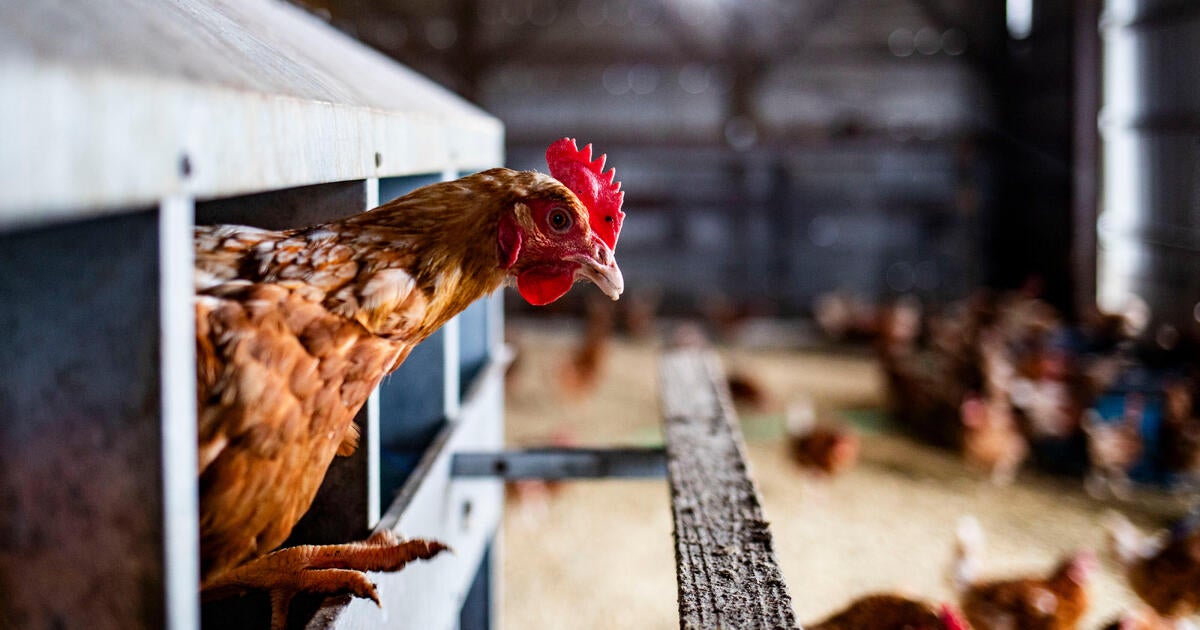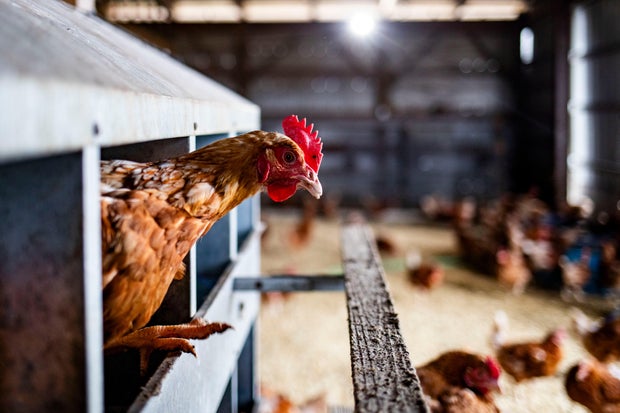In spite of a big federal funding to assist egg and poultry manufacturers leap again from bird flu losses, discovering eggs at an inexpensive worth — or any eggs in any respect — stays a difficult process for customers around the U.S.
In January, egg prices rose 15.2%, and economists say they be expecting costs to proceed to upward push this 12 months.
The rise is because of the restricted choice of hens laying eggs presently. There are fewer hens on account of federal chicken flu keep an eye on measures. They require farmers to kill their chickens in the event that they find a chicken flu case in a flock — a procedure referred to as “culling” — to take a look at to forestall the viral illness from spreading.
When farmers cull their flocks to forestall the unfold of a illness just like the chicken flu, they’re eligible for public cash to assist them change the flocks.
Since 2020, the Division of Agriculture has paid $1.1 billion to loads of egg manufacturers who needed to cull their flocks to forestall chicken flu from spreading, in keeping with a CBS Information research of federal information.

Now, the USDA says it will ship $400 million extra to farmers who want new chickens. The company additionally says it’s going to pay $500 million for biosecurity measures and $100 million “for vaccine analysis, motion to cut back regulatory burdens, and exploring brief import choices.”
Frank Singleton, a spokesperson for Wayne-Sanderson Farms — the 3rd greatest poultry manufacturer within the country — is satisfied the USDA helps.
He says his corporate has 23 vegetation and a pair of,000 spouse farms in seven states, using 26,000 folks around the Southeast and processing 21 million broiler chickens per week on the market in their meat into the patron marketplace.
Wayne-Sanderson Farms won greater than $600,000 from the USDA’s chicken flu help program to switch 3 flocks the corporate culled after finding chicken flu instances in 2023 and 2024.

Singleton says the assessments are the most important funding to assist the farms his corporate sponsors get again on target.
“It is a partnership with the farmers, and the patron, and our corporate, to verify we will proceed to feed The usa,” he says. “It might be very tricky to get a farmer to take a chance like that with out a farm spouse like Wayne-Sanderson Farms. In order that’s the place we step in. We be sure that we do our phase, our due diligence, assist them get again up to the mark, and paintings to verify the ones finances are to be had to them.”
Emily Elconin/Bloomberg by way of Getty Pictures
Culling flocks and shielding them from chicken flu
The method of culling is laborious. Singleton says his corporate sprays a foam agent over the affected chickens to kill them briefly.
“Other farms and other firms have other strategies,” he stated. “We use a humane technique to euthanize the entire birds. It is all supervised via regulatory people and our groups.”
“Ours is an authorised, USDA-approved way the place a foaming agent used, and it is very fast,” Singleton persisted. “So, the ones birds must be disposed of. The home itself needs to be wiped clean up and cleand. So it is a lengthy procedure, and it takes awhile for the farmer to get again up and working. So we paintings with them immediately to be sure that occurs.”
Singleton says there are a number of proactive measures his corporate is taking to give protection to farms from publicity within the first position.
Biosecurity measures are so tight for Wayne-Sanderson Farms, our CBS Information cameras weren’t allowed within a farm or facility.
“It simply takes one vector to contaminate a flock so, from the time folks come to the farm, the usage of disinfectant sprays, dressed in coveralls, dressed in private protecting tools, goggles, the ones sorts of issues — proscribing the kind of folks, the choice of folks,” Singleton defined. “We be sure that our folks have the apparatus, they’ve the chemical substances, the disinfectants, and they’ve the information. … It is very vital. Each and every person has to do their phase to be sure that this does not occur.”
His corporate helps a contemporary proposal from different egg and poultry business leaders to permit broiler eggs — eggs usually used to hatch chicks — for use in client merchandise amid the nationwide scarcity of conventional eggs.
After a regulation alternate in 2009 that stipulated that eggs should be refrigerated faster if offered into the patron marketplace, broiler egg manufacturers have been not ready to ship extra broiler eggs to client firms desiring them for such things as muffins and pies, as a result of broiler eggs are usually saved at the next temperature all through the primary 48 hours previous to cargo.
Singleton says his corporate throws out 560,000 broiler eggs per week — about 2% of the overall 26 million broiler eggs Wayne-Sanderson Farms produces.
If the Meals and Drug Management have been to permit the broiler eggs for use in client merchandise, Singleton says, it might be a win-win.
“We no doubt need to do our phase to assist feed the rustic and (remedy) a necessity the place a necessity is there; no doubt (that) would assist us from a waste viewpoint and simply from staff having to paintings on that individual side of it,” Singleton stated. “So, it is in reality only a price financial savings and an potency financial savings and striking meals again into the market for customers.”
In a commentary to CBS Information, the Meals and Drug Management says it’s nonetheless taking into account the proposal.
A smaller farm’s means within the chicken flu saga
Some other corporate these days ready to fill the will is a small impartial farm within the northern Alabama town of Madison known as Southard Farms.
It’s been in co-owner Keith Southard’s circle of relatives for 5 generations. Southard became the farm right into a pasture-raised poultry, egg and red meat manufacturing operation in 2019 and not dreamed his trade could be booming so quickly.
He says during the last month, his telephone has been ringing off the hook with eating places looking for eggs.
“It is been it is been loopy. It is been busy. My telephone rings continuously,” Southard stated. “Massive, massive alternative for enlargement, and individuals are looking out now … now not simply to seek out eggs however one thing other — to seek out excellent eggs, contemporary, native, that they do not simply rely on a shop to offer them; they know the place it is coming from.”
Southard’s father grows grows plants at the farm they usually in flip use the plants as feed for his chickens.
He has 900 laying hens for eggs and 700 broiler chickens — or chickens used for meat.
At the moment, Southard’s hens lay about 400 eggs per week. A couple of weeks in the past, Southard signed a freelance with a cafe in Birmingham to promote it 500 dozen eggs per week. Southard says he expects his general egg manufacturing in the following few months will probably be slightly below 1,000 dozen per week to fulfill the call for.
In contrast to in conventional egg farms, the place laying hens are stored in an indoor warehouse, Southard’s chickens reside an outside way of life, rotating frequently onto contemporary grass to graze. He says the pasture-raised structure assists in keeping his chickens’ immune programs more potent.
“No medications had to stay them going. So, we simply use nature’s advantages,” Southard says.
Then again, the out of doors dwelling may lead them to extra at risk of entering touch with wild birds which may be wearing the avian (chicken) flu.
“There may be at all times that chance,” Southard says. “We simply hope that it does not have an effect on us.”
Remaining 12 months, Southard needed to cull his flock after chickens were given hit with a bacterial an infection, other than chicken flu, known as mycoplasma. He says the enjoy used to be devastating.
“I realized a couple of signs, after which inside 3 days, we went from an ordinary quantity of eggs in keeping with day to nearly 0, and it used to be very equivalent signs to the avian flu, so (we) in an instant took the hens to the state lab for trying out … and after we were given the ends up in, there in reality wasn’t any resolution however to only cull the flock and get started over,” Southard recalled.
He stated he and his farmhand needed to in my opinion kill each and every rooster via slicing their throats to make it as fast and painless for the birds as conceivable.
“Not anything I need to see once more, that is needless to say,” Southard stated.
As a result of mycoplasma isn’t thought to be a “highly-pathogenic” illness, he didn’t qualify for the USDA’s program to obtain a test to assist him finance the alternative of his chickens.
“We simply bared via it and stored going,” Southard says.
And stored going he did.
Southard took us to Farm Burger in Huntsville, Alabama, one of the vital eating places that makes use of his rooster meat and eggs. The personnel affectionately calls out, “The Rooster Guy’s right here!” upon his arrival to ship his product in individual each and every week.
The eating place’s co-owner and supervisor says Southard has been a blessing to his trade as a result of Southard has stored his costs low at a time when different eating places in neighboring states have noticed egg prices greater than double in the previous couple of months.
Low costs for the eating place additionally imply prices wouldn’t have to be handed directly to consumers.
A CBS Information research of federal information discovered some farms won massive assessments from the USDA indemnity and compensation program after culling their flocks final 12 months — one egg manufacturer won $10 million.

Requested his ideas concerning the taxpayer expense, Southard stated, “I believe there is most likely, there is indisputably a query there about when USDA will have to get entangled or now not. So, I believe that are meant to be seemed into to a few extra, as a result of clearly we see nonetheless those large provide issues. So, I do not believe we’ve the correct resolution but, but it surely will have to be seemed into some extra.”
With provide problems and top egg prices anticipated no less than any other 12 months, Southard says it can be crucial to give protection to small farms.
“Small farmers like us, circle of relatives farms, play a key position, as it takes away the massive consolidation that is came about and spreads out the chance the place you could have extra farms around the state or nation and extra farmers,” Southard says. “So, if one will get hit, it isn’t as large of an impact at the complete provide chain.”
contributed to this file.




